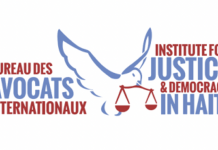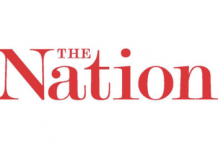by Kim Ives (Haiti Liberte)
On May 8, lawyers representing over 5,000 Haitian cholera victims told the United Nations that they are taking the world body to court in 60 days if it doesn’t accept responsibility for introducing the deadly microbe into Haiti’s waters.
Lawyers Brian Concannon, Jr. and Ira Kurzban of the Institute for Justice and Democracy in Haiti (IJDH) said they will file a lawsuit in New York courts in early July if UN officials don’t walk back their claim to be immune from all responsibility for unleashing the world’s deadliest cholera epidemic when they allowed cholera-infected Nepalese troops to deploy and discharge their sewage into the headwaters of the Artibonite River on Haiti’s Central Plateau in October 2010. Since then, the disease has spread throughout Haiti, killing over 8,300 and sickening over 670,000.
Meanwhile, on May 9, the Haitian Senate unanimously voted for (with only one abstention) a resolution demanding that the UN compensate Haitian cholera victims. Among other things, the senators proposed “the creation of a commission of experts in international and penal law to study what legal means, both nationally and internationally, we could use to prove the MINUSTAH’s responsibility” for unleashing the cholera epidemic.
In February, UN Secretary General Ban Ki-moon rebuffed a petition which IJDH and the Port-au-Prince-based Office of International Lawyers (BAI) filed with the world body in November 2011 seeking UN financial compensation for 5,000 Haitian petitioners, constructive action to prevent cholera’s spread, and a formal acknowledgment of and apology for the UN’s responsibility for bringing cholera into Haiti.
The 37-page complaint charged that the “UN is liable for negligence, gross negligence, recklessness, and deliberate indifference for the health and lives of Haitian people resulting in petitioners’ injuries and deaths from cholera.”
The lawyers delivered their latest ultimatum at the UN headquarters’ Dag Hammarskjold Library Auditorium in New York, the same venue where they announced the original petition.
Concannon and Kurzban were joined by Haitian Dr. Jean Ford Figaro, who is the Health Education Coordinator at Boston Medical Center. “Now cholera is getting worse,” Dr. Figaro told the press conference. “The UN failed to follow the recommendations they asked for, the recommendations they promised to implement, the recommendations that cost them no money at all. Because of this, the Haitian people have no choice but to seek justice by legal means.”
In their February response, a two-page letter which took 15 months to draft, the UN argued that “these claims are not receivable pursuant to Section 29 of the Convention on the Privileges and Immunities of the United Nations.”
‘‘They may have immunity, but they don’t have impunity,’’ responded Ira Kurzban.
The lawyers will seek $100,000 for the family of each cholera victim who died and $50,000 for each victim who lived through the ordeal. If successful, the lawsuit could cost the UN billions of dollars.
Despite having thousands of petitioners in Haiti, in order to pursue the lawsuit in New York, the IJDH lawyers need Haitians victims living in New York to step forward to be represented by them. The criteria to become a claimant in this imminent suit against the UN are: 1) that you are a resident of New York State; 2) that you or your child have personally contracted cholera in Haiti and sought medical attention in Haiti or elsewhere; or 3) that you lost an immediate family member to cholera.
For any questions or more information, contact the Institute for Justice & Democracy in Haiti, 666 Dorchester Ave., Boston, MA, kolera@ijdh.org or call 347-770-1008.
From left to right, Dr. Jean Ford Figaro of Boston Medical Center, Brian Concannon, Jr. and Ira Kurzban of IJDH. The UN “may have immunity, but they don’t have impunity,’’ Kurzban said.





